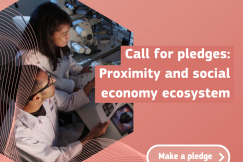Library
17 April 2025
Harnessing Innovation Ecosystems for Citizen Participation: Insights from Portugal, Spain, and the Netherlands
Library
17 April 2025
Transformative Digital Transition
Proximity and social economy
Digital
+10 more
Login / create an account to be able to react
-
8

The OECD has released a report exploring how innovation ecosystems in Portugal, Spain, and the Netherlands use emerging technologies to enhance citizen participation. It shows that local governments play a key role, but progress is held back by a lack of coordination, digital barriers, and scattered initiatives.
Topics
Netherlands
Portugal
Spain
Academic / Research and VET Institutions
Cluster Organisations
Consumer Organisations
Cultural and Heritage Organisations
Destination Management & Marketing Organisations
EU Institutions
International Organisations
Local Authorities
Media / Journalist Organisations
National authorities
Notified Bodies
Regional Authorities
Social Economy Entity
-
Thematic area
-
-
Transformative Digital Transition
-
-
Interlinkages with other sectors
-
-
Proximity and social economy
-
Digital
-
-
Action areas and keywords
-
-
Digital Platforms
-
Digital social innovation
-
Strategy for Data
-
Tech for Good
-
-
Ecosystem focus
-
-
Proximity economy
-
Social economy
-
-
Scope of activity
-
-
International
-
Local/neighbourhood
-
National
-
Regional
-
Share
Barcelona Hosts Meeting on Sustainable Tourism and Social Economy
The Organisation for Economic Co-operation and Development (OECD) has published a new report examining how innovation ecosystems are driving citizen participation through emerging technologies in Portugal, Spain, and the Netherlands. The study explores how governments, social enterprises, academic institutions, and the civil society collaborate to create inclusive, transparent, and participatory governance models using digital tools.
Despite increasing public demand for participation, challenges such as fragmented initiatives, limited public sector capacity, and digital exclusion persist. The report identifies local governments as key drivers of innovation because of their direct engagement with communities, their ability to fund initiatives, and their role in creating experimentation spaces and setting strategic priorities However, stronger national policies, clearer standards, and better cross-sector collaboration are needed to scale these initiatives.
Key findings from the three countries:
- Portugal: Local governments lead innovation, but participation remains limited by digital divides and a lack of sustained funding. Initiatives like participatory budgeting and blockchain-powered civic platforms offer scalable models.
- Spain: A highly decentralised system fosters strong citizen participation at the local level, but national coordination is weak. Successful models like Decidim and Consul Democracy open-source participation platforms have been replicated globally.
- Netherlands: A public-private-academic collaboration model fuels innovation, yet private sector dominance risks excluding marginalised voices. Municipalities play a strong role in testing and scaling participatory tools.
Policy recommendations
The OECD recommends that governments develop national strategies to guide the use of emerging technologies for citizen participation while ensuring stronger digital inclusion efforts to prevent inequalities in access. Investing in cross-sector collaboration, particularly between social enterprises, civil society, and policymakers, can help scale participatory technologies more effectively. Additionally, sustained funding mechanisms are essential to support long-term innovation in citizen engagement, reducing reliance on short-term or fragmented initiatives.
Conclusion
This report highlights the transformative potential of innovation ecosystems in making governance more participatory, transparent, and inclusive. However, scaling these efforts requires coordinated national strategies, investment in digital equity, and stronger connections between local and global initiatives.
For a deeper dive into the findings, read the full report here.
Documents
Comments (0)
See also
-
5
Transformative Digital Transition Highlights April and May 2025
- Categories
- Proximity and social economy Agri-food Construction +62 more
-
37
Progress report of the proximity and social economy Transition Pathway: Key insights
- Categories
- Regenerative Green Transition Skills Transformative Digital Transition +59 more
-
21
OECD Private Philanthropy for Development: Data for Action dashboard
- Categories
- Partnerships Transformative Digital Transition Proximity and social economy +24 more




